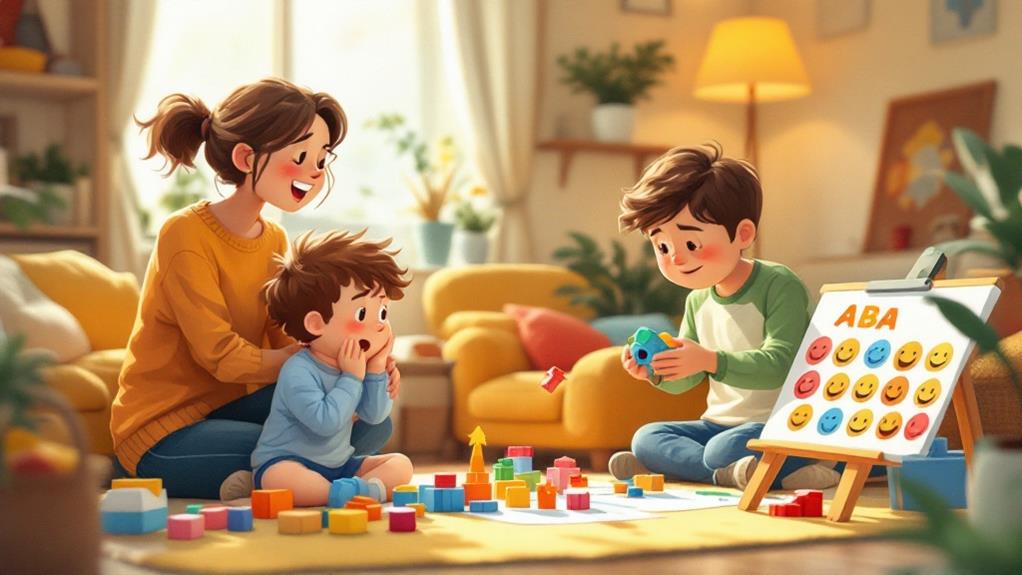If your child struggles with communication, social skills, or has emotional regulation issues, they might benefit from ABA therapy. Maybe they find it hard to express what they need, or they repeat certain actions often. You might notice they have trouble making friends or handling daily routines like mealtime. These challenges can lead to frustration for both you and your child. ABA therapy can provide tailored support to help kids develop essential skills and improve their behavior. Understanding these signs can be the first step toward finding the right help and creating positive changes in your child's life. You'll discover more insights ahead.
Key Takeaways
- Communication Challenges: If your child struggles to express needs or understand simple questions, ABA therapy can help improve their communication skills.
- Difficulty with Social Skills: Trouble making friends or understanding social cues may indicate a need for ABA therapy to enhance social interactions.
- Repetitive Behaviors: Excessive repetitive actions, like hand-flapping, can interfere with daily life; ABA therapy offers strategies to manage and reduce these behaviors.
- Emotional Regulation Issues: Frequent tantrums or extreme reactions to changes suggest your child may benefit from ABA therapy to learn healthier emotional responses.
- Struggles with Daily Routines: If maintaining routines leads to meltdowns, ABA therapy can introduce structure and visual aids to create a more organized environment.
Understanding ABA Therapy

Many parents find themselves wondering about the best ways to support their child's development, and understanding ABA therapy can be an essential step.
Applied Behavior Analysis (ABA) is a structured approach that focuses on improving specific behaviors while encouraging positive skills. It's not just about changing behavior; it's about teaching your child the skills they need to thrive.
You'll notice that ABA uses techniques like reinforcement to motivate your child. For example, if your child successfully completes a task, they might receive praise or a small reward. This helps reinforce that positive behavior and encourages them to repeat it.
ABA is also tailored to your child's unique needs, meaning the strategies used can be adjusted as they grow and develop.
Engaging with ABA therapy doesn't require you to be an expert. Instead, think of it as a partnership between you, your child, and the therapist.
Sign One: Communication Challenges
Communication can be a significant hurdle for some children, and noticing signs of struggle is essential for their development. If your child has difficulty expressing their needs or feelings, it might be time to take a closer look at their communication skills. You may notice they often point instead of using words or struggle to form complete sentences. These challenges can lead to frustration for both your child and your family.
Pay attention to how your child interacts during playtime or conversations. Do they avoid eye contact? Do they seem to have trouble understanding simple questions?
These signs can indicate that they're not only struggling to communicate but also missing out on crucial connections with others.
Sign Two: Difficulty With Social Skills

When children struggle with communication, it often spills over into their social interactions. You might notice your child having trouble making friends or joining in on group activities. They may seem shy or withdrawn, or perhaps they don't understand social cues like body language or tone of voice. These challenges can leave them feeling isolated and frustrated.
It's important to recognize that social skills are essential for building meaningful relationships. If your child often finds themselves on the outside looking in, it may be beneficial to explore how ABA therapy can help. Through structured techniques, ABA can teach your child how to initiate conversations, share interests, and respond appropriately to others.
You can support your child by providing opportunities for social interactions, whether it's through playdates, group sports, or community activities. Pay attention to their strengths and interests, and encourage them to engage with peers who share those passions.
Sign Three: Repetitive Behaviors
Repetitive behaviors can be a clear indicator that your child might benefit from ABA therapy. You may notice your child engaging in actions like hand-flapping, spinning, or repeating certain phrases or movements. While many children exhibit some repetition, it's crucial to reflect on whether these behaviors interfere with daily life or social interactions.
If your child's repetitive actions seem to provide comfort, they might be using them to cope with stress or anxiety. However, when these behaviors become excessive, they can hinder your child's ability to engage with others or explore new experiences.
For example, if your child spends more time spinning in circles than playing with friends, it might be time to seek support.
ABA therapy can provide valuable strategies to address these behaviors, encouraging healthier coping mechanisms while fostering social interactions. By working with a trained therapist, you can help your child understand when to engage in these behaviors and when to try something new.
Recognizing the need for help is a positive step toward nurturing your child's growth and happiness. Together, you can create a more balanced and fulfilling environment for them.
Sign Four: Emotional Regulation Issues

Emotional regulation issues can often accompany the repetitive behaviors you've observed in your child.
These challenges can make it tough for your little one to manage their feelings, leading to outbursts or withdrawal during emotional moments. Recognizing these signs can help you decide if ABA therapy might be beneficial.
Here are three indicators of emotional regulation struggles:
- Frequent tantrums or meltdowns: If your child often has intense reactions to seemingly minor frustrations, this could signal difficulty in managing emotions.
- Difficulty calming down: You may notice your child struggles to regain composure after becoming upset, requiring extra time and support to settle.
- Extreme reactions to change: Sudden shifts in routine can lead to heightened anxiety or distress, indicating that your child might be wrestling with emotional control.
If these signs resonate with you, know that ABA therapy can offer strategies to help your child navigate their emotions more effectively.
It's about giving them the tools they need to express themselves in healthier ways, leading to more balanced interactions and a happier home environment.
Sign Five: Struggles With Daily Routines
As your child navigates their daily life, you may notice they struggle to maintain consistent routines, which can lead to frustration for both of you. Whether it's getting ready for school, mealtime, or bedtime, these challenges can disrupt your family's harmony. You might see them feeling overwhelmed by changes or resisting alterations in their schedule, leaving you feeling helpless.
These daily routines are essential for creating a sense of security and predictability for your child. Without this structure, they may experience anxiety or meltdowns. For instance, if your child struggles to shift from playtime to homework, it can become a battleground of emotions. You want to support them, but you might feel at a loss on how to help.
This is where Applied Behavior Analysis (ABA) therapy can step in. ABA therapists can work with your child to develop skills that promote smoother changes and establish routines. They can help create visual schedules or introduce reinforcement strategies that encourage your child to engage positively with daily tasks.
Recognizing these struggles and seeking support can lead to a more peaceful and organized home life for everyone involved.
Benefits of Early Intervention

Early intervention can be a game-changer for your child's development. When you act early, you're not just helping your child now; you're setting them up for a brighter future.
Here are three key benefits of early intervention:
- Improved Skills: Starting therapy early can help your child learn essential skills—social, communication, and daily living skills—more effectively.
- Better Outcomes: Research shows that children who receive early intervention often achieve better academic and social outcomes. They're more likely to thrive in school and make friends.
- Family Support: Early intervention isn't just about the child; it's about the whole family. You'll gain access to resources, guidance, and a supportive community that understands your journey.
How ABA Therapy Works
Applied Behavior Analysis (ABA) therapy is a structured approach that focuses on understanding and improving specific behaviors. It's all about breaking down skills into smaller, manageable steps, making it easier for your child to learn and grow.
During ABA therapy, a trained therapist observes your child and identifies behaviors that may need support or adjustment. From there, they'll create a tailored plan that includes clear goals and strategies.
These strategies often involve rewarding positive behaviors to encourage them further. For instance, if your child struggles with sharing, the therapist might praise them when they successfully share a toy. Over time, this reinforcement helps your child understand the connection between their actions and positive outcomes.
ABA therapy isn't just about correcting behaviors; it's about building skills that promote independence and social interaction. As your child learns, they'll gain confidence and a sense of accomplishment.
The process is collaborative, too—parents and caregivers are involved every step of the way, ensuring that the strategies used at therapy carry over into daily life. This partnership makes a real difference in helping your child thrive.
Choosing the Right Therapist

Finding the right therapist for your child can feel overwhelming, especially after learning about how ABA therapy works and its benefits.
It's important to choose someone who understands your child's unique needs and can build a positive relationship with them. Here are three key factors to take into account:
- Qualifications and Experience: Look for a therapist with the appropriate certifications and experience in ABA therapy. Check if they've worked with children who've similar challenges to your child.
- Approach and Philosophy: Every therapist has a different style. Some may focus on play-based methods while others might use more structured techniques. Make sure their approach aligns with your family's values and your child's needs.
- Communication and Rapport: A good therapist should communicate effectively not just with your child, but with you as well. Pay attention to how they interact with your child during the initial meetings—this can give you insights into their ability to form a connection.
Choosing the right therapist is essential for your child's growth and success.
Take your time and trust your instincts; the right fit is out there!
Success Stories From Families
When families share their experiences with ABA therapy, the stories often highlight remarkable transformations that can inspire hope. You might hear about parents who once felt overwhelmed by their child's challenging behaviors, only to find that ABA therapy opened new doors for understanding and communication.
Take, for example, the Johnsons, who struggled with their son's inability to express his needs. After starting ABA therapy, they saw him learn essential communication skills through fun and engaging activities. His frustration decreased, and family outings became more enjoyable.
Then there's the Martinez family, whose daughter faced difficulties in social situations. Thanks to ABA therapy, she learned how to initiate conversations and make friends. Her newfound confidence blossomed, allowing her to participate in playdates and school events with joy.
These stories remind us that every child's journey is unique. While the path to progress may be challenging, the rewards can be profound.
If you're considering ABA therapy, remember that countless families have found success and hope through this approach. You're not alone on this journey, and positive change is possible for your child, too.
Conclusion
To sum up, recognizing these signs can be a game-changer for your child's development. If your little one struggles with communication, social skills, or emotional regulation, ABA therapy could make a world of difference—like finding a treasure map to their potential! Early intervention opens doors to growth and understanding, so don't hesitate to reach out for help. Choosing the right therapist can lead your family on a journey toward brighter days filled with progress and joy.

